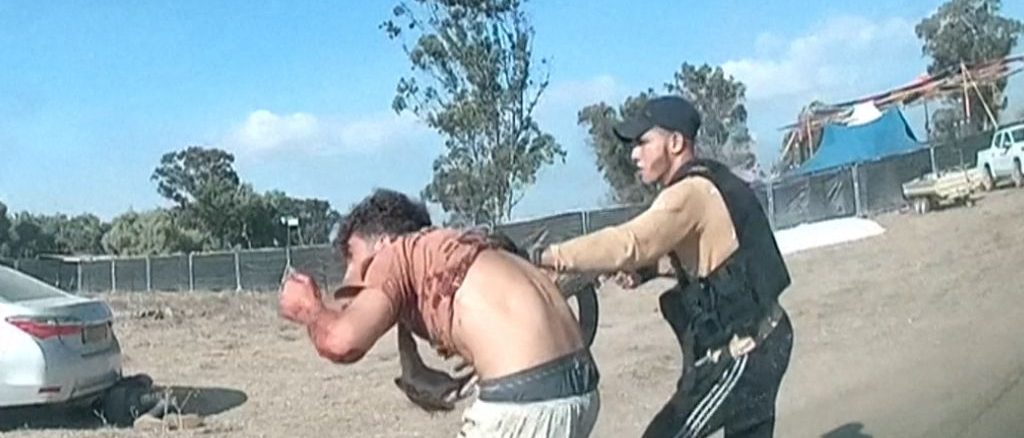
Diplomacy or rescue? Gaza hostage crisis is ‘extra complicated’
Hamas has been holding an estimated 150 men, women, children, and elderly hostages across the Gaza Strip since Saturday. “The situation is very worrying,” says former Minister of Foreign Affairs Ben Bot. “This group of hostages is the greatest asset Hamas has.”
In addition to Israelis, the terrorist movement has also kidnapped dozens of people from abroad. And all these countries are putting pressure behind the scenes on the government in Jerusalem to get their citizens back safely. “The fact that so many nationalities are involved makes the situation even more complicated,” Bot continues.
How do you save dozens of people who may be held as living shields in a war zone? Experts call it almost impossible to free so many people in a densely populated urban area like Gaza under these circumstances with rescue operations.
‘Everything has to be right’
“A ‘normal’ military campaign is more obvious than attempting to track down 150 people and bring them back in one piece,” says intelligence and security expert Bob de Graaff. “For such surgical operations in enemy territory, everything has to be right, otherwise, you run the risk of causing even more victims.” Especially as fighters from Hamas and Islamic Jihad are prepared for rescue attempts.
The best option for the hostages is negotiations between the warring parties, the two experts agree. But that scenario seems very far away. Bot: “Hamas does not know where to give way, and Israel is looking for a firm approach.”
Behind the scenes
It is impossible to say whether the enemies are in contact behind the scenes about the hostage crisis. However, former minister Bot considers the chance of this to be small. “Israel now wants to make a clear point and not be accused afterward that sweet cakes were already being baked in secret.”
Hamas threatens to execute the hostages one by one if Israel bombs civilians in Gaza without warning. Video footage suggests at least four kidnapped Israelis killed shortly after being taken hostage reports The Washington Post.
There is uncertainty about how the other abductees are doing. An exception is the German Shani Louk, who was placed unconscious in the back of a truck after her kidnapping at a music festival. According to her mother, the young woman is seriously injured in a hospital in northern Gaza.
It is unclear exactly how many Israelis and foreigners are being held hostage. Estimates range from 100 to 200. In addition to Israeli civilians, these include soldiers. They are being held by various militias, the largest of which is Hamas.
Citizens from thirteen other countries are missing: the United States, Germany, France, Italy, Austria, Russia, Great Britain, China, the Philippines, Nepal, Thailand, Brazil, and Mexico. In several cases, it has been established that people have been kidnapped from these countries.
Hamas has said it wants to free all Palestinian prisoners in Israeli prisons in exchange for the Israeli hostages. In total, about 4,500 Palestinians are believed to be in custody.
Leave no man behind?
In 2011, Israel released about a thousand Palestinians in exchange for one of its own soldiers: Gilad Shalit. But analysts do not think that the Israeli authorities will make such a decision in this conflict. “The leave no man behind policy becomes extremely difficult to implement, if not impossible, at such a scale,” says De Graaff.
Qatar and Turkey are negotiating with Hamas to free hostage citizens. This was stated by anonymous officials from the two countries, who regularly act as mediators, to international media. Bot calls this hopeful for hostages. “Only Islamic countries can come into direct contact with the leaders of Hamas.” An interim solution may be possible in this way, for example, for foreigners who are being detained.
In the current situation, no country will launch a rescue operation in Israel on its own.
Bob de Graaff, intelligence and security expert
The Red Cross is in contact with both Hamas and Israel. The aid organization offers to provide the hostages with medical assistance and to assist with possible releases.
A humanitarian crisis is raging in the heavily bombed Gaza Strip: emergency aid is barely arriving. Only when the hostages are released will Gaza regain access to power, water, and fuel, the Israeli Energy Minister said today.
Time is running out for the hostages. Israel’s national unity government, formed yesterday, is trying to find a way out of the hostage crisis. “There is a fierce debate going on within the government about what to do and how restrained the army should be because of the hostages,” said analyst Tobias Borck of think tank RUSI against the news site Politico.
Increase pressure
According to former professor of terrorism and counterterrorism De Graaff, one thing is certain: “No country, including the US, will launch a rescue operation on its own in the current situation. The only thing governments can do for their fellow countrymen is to increase pressure on both Hamas like Israel.”
The question is how much diplomacy can achieve if both sides stick to their guns. However, according to former minister Bot, the influence of foreign pressure should not be underestimated. “The more countries and organizations show unity to resolve this in a constructive manner, the better.”

Be the first to comment